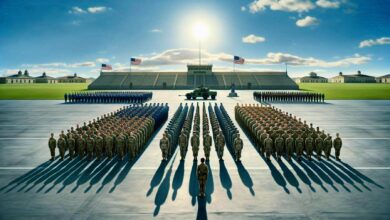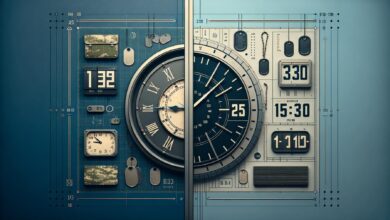Is 00:00 AM or PM?

When it hits 00:00, we often wonder, is the day ending or just beginning? We’re used to the 12-hour clock, where AM and PM help us tell time. But the 24-hour clock, or ‘military time,’ is different. It’s essential to understand this to avoid any confusion.
The question of 00:00 might seem hard to grasp. Different cultures and timekeeping systems see it in various ways. This article aims to make it clear. Is 00:00 the start of a new day or the end of the last one? Keep reading to find out. We’ll explore how time is noted, helping you understand clocks better.
Contents
Understanding the 24-Hour Time Format
Ever wondered why the 24-hour clock is standard in many places, unlike the U.S.? This section looks at how 24-hour timekeeping started, its differences from the 12-hour system, and how cultures view midnight differently.
Origins of the 24-Hour Clock System
The story of the 24-hour clock goes back to the Egyptians. They created a system dividing day and night into 12 hours each, based on the light and dark of seasons. This ancient technique greatly influenced how we view time today.
Differences Between 12-Hour and 24-Hour Timekeeping
- Notation: The 24-hour system ranges from 0 to 23, clarifying if a time is in the morning or evening.
- Error Reduction: It avoids confusion since “15:00” can’t be mixed up with “3:00 AM.”
- Global Standard: The 24-hour format is used worldwide, especially in the military, medical fields, and science, unlike the U.S.’s 12-hour clock.
How Midnight is Represented in Different Cultures
Midnight means different things in various cultures. For some, it’s a magical time full of possibilities. Others see it as just the start of a new day. Across the globe, the view and importance of midnight can vary a lot, showing its deep cultural roots.
Deciphering Midnight: Is 00:00 AM or PM?
When 00:00 hits, people often get mixed up. Is it the start of a new day, or just a point where time resets? We’ll explore what 00:00 truly signifies, its use in various settings, and its importance in civilian and military life.
What Does 00:00 Really Mean?
00:00’s meaning changes based on the situation. Generally, it signals the day’s start. Sometimes called midnight in military speak, it begins a new 24-hour cycle. However, some might feel it’s more like the day’s end.
Is 00:00 the End of the Day or the Beginning?
The debate on 00:00 being the end or start of a day is quite interesting. In most cases, 00:00 is seen as the beginning. Systems and documents use 00:00 to start a new day. This matters for travel, recording data, and legal papers.
Civilian vs. Military Time Interpretation
For non-military folks, 00:00 is when one day shifts to the next. But in military timing, 00:00 is vital. It starts a new operational day. This clear cut helps in planning and keeps everyone on the same page.
To sum it up, knowing how 00:00 is viewed in different situations can clear up any confusion about this specific time.
The Start and End of the Day Explained
Understanding the transition of days in different time systems greatly affects our planning and schedule reading. We’ll explore the rules that define these key moments of our daily life.
Both the 12-hour and 24-hour time systems are used worldwide, each with its own way of marking the day’s start and end. Let’s take a quick look at how these systems define the daily cycle:
- The 12-hour clock sees midnight as 12:00 AM and midday as 12:00 PM. It’s confusing without the AM and PM signs.
- The 24-hour clock starts the day at 00:00 and ends at 23:59. This system makes midnight clear without extra signs.
Day transitions are not just about clock time. They have legal and practical effects on business and personal plans. Global standards like ISO suggest the 24-hour format to clear up any confusion in legal, transport, and safety areas.
- Remember that the cycle refreshes at midnight (00:00 or 12:00 AM). This marks a new day’s start.
- See midday (12:00 PM in 12-hour or 12:00 in 24-hour format) as the daily cycle’s half point. It’s vital for worldwide scheduling.
By using these guidelines in your daily life, scheduling becomes easier. This ensures your plans and documents are clear.
Practical Tips for Avoiding Confusion with Midnight Times
Scheduling around midnight often causes confusion. Here are tips and digital tools to improve time management. They make it clearer and more effective.
Best Practices in Scheduling Around Midnight
Use these tips when scheduling near midnight:
- Always add the date with the time to avoid confusion. For example, say ’11:59 PM, June 10′ or ’00:01 AM, June 11′.
- For international meetings, use UTC. It helps avoid mistakes across time zones.
- Sync digital calendars across devices to ensure everyone knows the event time.
International Standards for Recording Time
To keep your records accurate, follow these standards:
- Use ISO 8601 for clear date and time. It uses a 24-hour clock and dates start with the year.
- In legal documents, record when events start and end. This helps with clarity and following rules.
Smart Devices and Digital Interfaces: How They Display 00:00
Digital clock displays vary by device:
- Most show 00:00 as the start of a new day. Check your settings for a 12-hour or 24-hour display.
- Smart devices let you pick ‘AM/PM’ or ’24-hour’ format. Choose what makes scheduling easier for you.
Conclusion
As our discussion ends, you should now clearly understand 00:00 within the 24-hour clock. We’ve explored its history and how different cultures use it. This has helped clear up any confusion about midnight. We explained the difference between the 24-hour and 12-hour clocks. This might have helped you with planning before.
Knowing if 00:00 is the start or end of your day is important. It helps avoid mistakes when setting alarms or planning events. At work, it means you can schedule meetings and deadlines accurately, even across different time zones. Worldwide, following these rules can prevent big misunderstandings.
Now, when you see 00:00, you know it marks the start of a new day. With the military time format and international timekeeping standards, you can plan better. You’re ready to handle planning and scheduling with ease. Your time management skills will improve.



